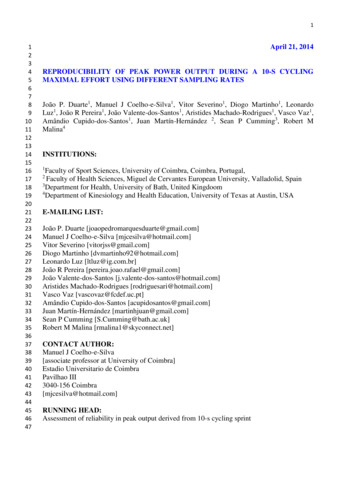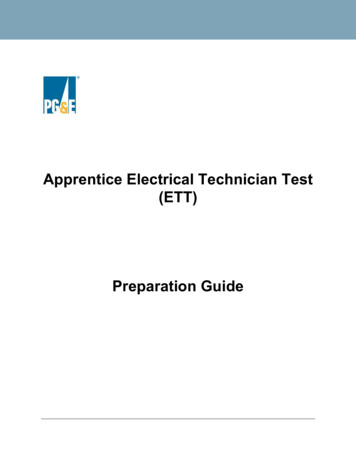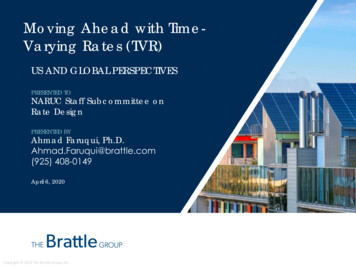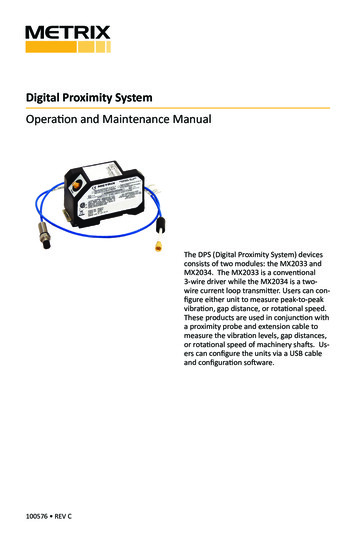
Transcription
PeakSecrets from theNew Science of ExpertiseAnders Ericsson and Robert PoolNew York: Houghton and Mifflin Harcourt [2016]This is a book about the gift that WolfgangAmadeus Mozart, Sakakibara’sschoolchildren, and Ray Allen all shared—the ability to create, through the right sortof training and practice, abilities that theywould not otherwise possess by takingadvantage of the incredible adaptabilityof the human brain and body.In this review2Quotes from Peak8Presentation OutlineWhy is this book worth our time?#1 – For personal growth, for businesseffectiveness, we all need to know how toget “good” at something. This bookprovides tangible steps to help.#2 – The science of expertise is transferableto areas not yet using such science. Thisbook will help us think about getting good inareas not-yet-thought-about (in otherwords, not just chess, or athletics, or ).#3 – This book will help us understand thateveryone – yes, everyone – can developgenuine expertise.
QuotesQuotes and excerpts from the book – (the “best of” Randy’s highlights):1. WHY ARE SOME PEOPLE so amazingly good at what they do? 50(Note: The “#s” followingeach quote indicate theKindle App for the iMac“location” of the quote inthe book.)2. And over time I’ve come to understand that, yes, these people do havean extraordinary gift, which lies at the heart of their capabilities. But it isnot the gift that people usually assume it to be, and it is even morepowerful than we imagine. Most importantly, it is a gift that every one ofus is born with and can, with the right approach, take advantage of. 56In short, perfect pitch is not the gift, but, rather, the ability to developperfect pitch is the gift—and, as nearly as we can tell, pretty mucheveryone is born with that gift. 1233. But since the 1990s brain researchers have come to realize that thebrain—even the adult brain—is far more adaptable than anyone everimagined, and this gives us a tremendous amount of control over whatour brains are able to do. 1314. Yes, in some cases genetic endowment makes a difference, particularly in areas where height or otherphysical factors are important. A man with genes for being five feet five will find it tough to become aprofessional basketball player, just as a six-foot woman will find it virtually impossible to succeed as anartistic gymnast at the international level. 1485. This is a book about the gift that Wolfgang Amadeus Mozart, Sakakibara’s schoolchildren, and Ray Allen allshared—the ability to create, through the right sort of training and practice, abilities that they would nototherwise possess by taking advantage of the incredible adaptability of the human brain and body. 1686.Since antiquity, people have generally assumed that a person’s potential inany given field is inevitably and unavoidably limited by that person’s inherenttalent. 172According to this view, each of us is born with a set of fixed potentials—apotential for music, a potential for mathematics, a potential for sports, apotential for business—and we can choose to develop (or not) any of thosepotentials, but we cannot fill any one of those particular “cups” up past itsbrim. 175But we now understand that there’s no such thing as a predefined ability. Thebrain is adaptable, and training can create skills—such as perfect pitch—thatdid not exist before. This is a game changer. 179In this new world it no longer makes sense to think of people as born with fixedreserves of potential; instead, potential is an expandable vessel, shaped bythe various things we do throughout our lives. 181Peak 2
Why are some people soamazingly good at whatthey do?7. Learning isn’t a way of reaching one’s potential but rather a way of developing it. We can create our ownpotential. 1838. In short, I have been asking, What works and what doesn’t and why? 1879. But sometimes these books leave the impression that heartfelt desire and hard work alone will lead toimproved performance—“Just keep working at it, and you’ll get there”—and this is wrong. 19110.The right sort of practice carried out over a sufficient period of time leads toimprovement. Nothing else. 19311. This book’s focus will be mostly on the mental side of expert performance, although there is certainly asignificant physical component to expertise in sports and other athletic endeavors. 21112. Some genetic factors may influence a person’s ability to engage in sustained deliberate practice—forinstance, by limiting a person’s capability to focus for long periods of time every day. 21813.Want to improve your tennis game? Deliberate practice. Your writing?Deliberate practice. Your sales skills? Deliberate practice. 225Because deliberate practice was developed specifically to help peoplebecome among the best in the world at what they do and not merely tobecome “good enough,” it is the most powerful approach to learning thathas yet been discovered. 22614. Indeed, Anthony Tommasini, the music critic at the New York Times, once commented that musical abilityhas increased so much since Cortot’s time that Cortot would probably not be admitted to Juilliard now. 31915.We live in a world full of people with extraordinary abilities—abilities that fromthe vantage point of almost any other time in human history would havebeen deemed impossible. 326But while the abilities are extraordinary, there is no mystery at all about howthese people developed them. They practiced. A lot. 33216. What the second half of the twentieth century did see was a steady increase in the amount of time thatpeople in different areas devoted to training, combined with a growing sophistication of trainingtechniques. This was true in a huge number of fields, particularly highly competitive fields such as musicalperformance and dance, individual and team sports, and chess and other competitive games. 33717. I have devoted my career to understanding exactly how practice works to create new and expandedcapabilities, with a particular focus on those people who have used practice to become among the best inthe world at what they do. 351I have found that no matter what field you study, music or sports or chess or something else, the mosteffective types of practice all follow the same set of general principles. 353 the most effective and most powerful types of practice in any field work by harnessing the adaptability ofthe human body and brain to create, step by step, the ability to do things that were previously not possible.357Peak 3
18. Furthermore, the practitioners in the various fields built their bodies of knowledge in isolation, with no sensethat all of this was interconnected—that the ice-skater who was working on a triple axel was following thesame set of general principles as, say, the pianist working to perfect a Mozart sonata. 36419. Generally the solution is not “try harder” but rather “try differently.” It is a technique issue, in other words. 51320.The best way to get past any barrier is to come at it from a different direction,which is one reason it is useful to work with a teacher or coach. 52121. And sometimes it turns out that a barrier is more psychological than anything else. 52322. So here we have purposeful practice in a nutshell: Get outside your comfort zone but do it in a focused way,with clear goals, a plan for reaching those goals, and a way to monitor your progress. Oh, and figure out away to maintain your motivation. 56023. Trying hard isn’t enough. Pushing yourself to your limits isn’t enough. 60524. Recent studies have shown that learning a new skill is much more effective at triggering structural changes inthe brain than simply continuing to practice a skill that one has already learned. 838The brain, like the body, changes most quickly in that sweet spot where it is pushed outside—but not too faroutside—its comfort zone. 840In every area that scientists have studied, the findings are the same: long-term training results in changes inthose parts of the brain that are relevant to the particular skill being developed. 87625.They live in the world of “good enough.” 940And, for the most part, that’s okay. “Good enough” is generally good enough.But it’s important to remember that the option exists. If you wish to becomesignificantly better at something, you can. 94426.The traditional approach is not designed to challenge homeostasis. It assumes,consciously or not, that learning is all about fulfilling your innate potential andthat you can develop a particular skill or ability without getting too far out ofyour comfort zone. 946In this view, all that you are doing with practice—indeed, all that you cando—is to reach a fixed potential. 948With deliberate practice, however, the goal is not just to reach your potentialbut to build it, to make things possible that were not possible before. 94927. Research has shown that the amount of time spent in this sort of analysis—not the amount of time spentplaying chess with others—is the single most important predictor of a chess player’s ability. It generally takesabout ten years of this sort of practice to reach the level of grandmaster. Simon estimated that by the timea chess player becomes a master, he or she has accumulated some fifty thousand of these chunks. 106028. The way that grandmasters process and make sense of chess positions is an example of a mentalrepresentation. It is their way of “seeing” the board, and it’s quite different from how a novice would see thesame board. In short, while the mental representations give masters a view of the forest that novices lack,they also allow masters to zero in on the trees when necessary. 108329. Consider a competitive diver working on a new dive. Much of the practice is devoted to forming a clearmental picture of what the dive should look like at every moment and, more importantly, what it should feellike in terms of body positioning and momentum.A key fact about such mental representations is that they are very “domain specific ” a diver’s mental representations will be useless for basketball. 111030.This explains a crucial fact about expert performance in general: there is nosuch thing as developing a general skill. 1111Peak4
31. The main thing that sets experts apart from the rest of us is that their years of practice have changed the neuralcircuitry in their brains to produce highly specialized mental representations, which in turn make possible theincredible memory, pattern recognition, problem solving, and other sorts of advanced abilities needed toexcel in their particular specialties. 114932. In pretty much every area, a hallmark of expert performance is the ability to see patterns in a collection ofthings that would seem random or confusing to people with less well developed mental representations. Inother words, experts see the forest when everyone else sees only trees. 115633. This explains why the most successful quarterbacks are generally the ones who spend the most time in the filmroom More importantly, effective mental representations allow a quarterback to make good decisionsquickly Being able to make the right decision a tenth of a second faster can be the difference between a good playand a disastrous one—between, say, a completed pass and an interception. 117834. In other words, experienced climbers had developed mental representations of holds that allowed them toknow without conscious thought what sort of grip was required for each hold they saw. 118935. Some of you will be more expert than others in the task of understanding and assimilating the informationcontained in this book. 120836. Surgeons, for example, will often visualize an entire surgery before making the first incision. Developing suchmental representations of a surgery is one of the most challenging—and most important—things that asurgeon can do, and more experienced surgeons generally create more sophisticated and more effectiverepresentations of these procedures. 129737. The main purpose of deliberate practice is to develop effective mental representations, and, mentalrepresentations in turn play a key role in deliberate practice. 133838. In general, mental representations aren’t just the result of learning a skill; they can also help us learn. 135639. In any area, not just musical performance, the relationship between skill and mental representations is avirtuous circle: the more skilled you become, the better your mental representations are, and the better yourmental representations are, the more effectively you can practice to hone your skill. 140140. Think of gymnastics, diving, figure skating, or dancing. Performers in these areas must develop clear mentalrepresentations of how their bodies are supposed to move to generate the artistic appearance of theirperformance routines. 144041. In short, there were no students who just loved to practice and thus needed less motivation than the others.These students were motivated to practice intensely and with full concentration because they saw suchpractice as essential to improving their performance. 158642.We found that the best violin students had, on average, spent significantlymore time than the better violin students had spent, and that the top twogroups—better and best—had spent much more time on solitary practice thanthe music-education students.3,420 hours5,301 hours7,410 hoursLooking more closely, we found that the largest differences in practice timeamong the three groups of students had come in the preteen and teenageyears. 160043. By now it is safe to conclude from many studies on a wide variety of disciplines that nobody developsextraordinary abilities without putting in tremendous amounts of practice. 163644. Deliberate practice is purposeful practice that knows where it is going and how to get there. 1669Peak 5
45. In short, deliberate practice is characterized by the following traits: 1670Deliberate practice develops skills that other people have already figured out how to do and for whicheffective training techniques have been established. 1671Deliberate practice takes place outside one’s comfort zone and requires a student to constantly try thingsthat are just beyond his or her current abilities. Thus it demands near-maximal effort, which is generally notenjoyable. 1673Deliberate practice involves well-defined, specific goals and often involves improving some aspect of thetarget performance; it is not aimed at some vague overall improvement. 1675Deliberate practice is deliberate, that is, it requires a person’s full attention and conscious actions. 1679Deliberate practice involves feedback and modification of efforts in response to that feedback. 1681Deliberate practice both produces and depends on effective mental representations. 1684Deliberate practice nearly always involves building or modifying previously acquired skills by focusing onparticular aspects of those skills and working to improve them specifically 168846.This is the basic blueprint for getting better in any pursuit: get as close todeliberate practice as you can. 1728In practice this often boils down to purposeful practice with a few extra steps:first, identify the expert performers, then figure out what they do that makesthem so good, then come up with training techniques that allow you to do it,too. 173047. be careful when identifying expert performers. 177048. Lesson: Once you have identified an expert, identify what this person does differently from others that couldexplain the superior performance. 180649.Gladwell did get one thing right, and it is worth repeating because it’s crucial:becoming accomplished in any field in which there is a well-established historyof people working to become experts requires a tremendous amount of effortexerted over many years. It may not require exactly ten thousand hours, but itwill take a lot. 187550.But I see the core message as something else altogether: In pretty much anyarea of human endeavor, people have a tremendous capacity to improvetheir performance, as long as they train in the right way. 189051. In those combats the pilots were expected to push their planes—and themselves—right up to the edge offailure in order to learn what the planes were capable of and what was required to get that performance outof them. 192152. the real action occurred once the pilots landed, in what the navy called “after-action reports.” What didyou notice when you were up there? What actions did you take? Why did you choose to do that? What wereyour mistakes? What could you have done differently? 192953. This distinction between knowledge and skills lies at the heart of the difference between traditional pathstoward expertise and the deliberate-practice approach. 213954. But one thing is clear: with few exceptions, neither doctors nor nurses gain expertise from experience alone.217855.Training should focus on doing rather than on knowing—and, in particular, onbringing everyone’s skills closer to the level of the best performers in a givenarea. 224556. The researcher Daniel Chambliss concluded that the key to excellence in swimming lay in maintaining closeattention to every detail of performance, “each one done correctly, time and again, until excellence in everyPeak 6
detail becomes a firmly ingrained habit.” 2468This is the recipe for maximum improvement from your practice. 247057. Maintaining this sort of focus is hard work even for experts who have been doing it for years. 247858.The hallmark of purposeful or deliberate practice is that you try to dosomething you cannot do—that takes you out of your comfort zone—andthat you practice it over and over again, focusing on exactly how you aredoing it, where you are falling short, and how you can get better. 252459.First, figure out exactly what is holding you back. What mistakes are you making,and when? Push yourself well outside of your comfort zone and see what breaksdown first. Then design a practice technique aimed at improving that particularweakness. Once you’ve figured out what the problem is, you may be able to fix ityourself, or you may need to go to an experienced coach or teacher forsuggestions. Either way, pay attention to what happens when you practice; if youare not improving, you will need to try something else. 264260. The ones who are successful in losing weight over the long run are those who have successfully redesignedtheir lives, building new habits that allow them to maintain the behaviors that keep them losing weight inspite of all of the temptations that threaten their success. 270761. Or maybe it’s for totally practical, extrinsic purposes. You hate public speaking, but you recognize that yourlack of speaking skills is holding you back in your career, so you decide you want to learn how to addressan audience. 274962. If you stop believing that you can reach a goal, either because you’ve regressed or you’ve plateaued,don’t quit. 2774Make an agreement with yourself that you will do what it takes to get back to where you were or to getbeyond the plateau, and then you can quit. You probably won’t. 277563. One of the best bits of advice is to set things up so that you are constantly seeing concrete signs ofimprovement, even if it is not always major improvement. 2827It doesn’t matter if the levels are arbitrary. What matters is that the teacher divides up what can look like aninfinite amount of material to learn into a series of clear steps, making the student’s progress more concreteand more encouraging. 283264. Musicians enjoy performing music. Mathematicians enjoy doing mathematics. Soccer players enjoy playingsoccer. 305265. In fact, people can train effectively well into their eighties. 308966. There are no big leaps, only developments that look like big leaps to people from the outside because theyhaven’t seen all of the little steps that comprise them. 324367. In other words, they worked harder than everyone else. 324968. Progress is made by those who are working on the frontiers of what is known and what is possible to do, notby those who haven’t put in the effort needed to reach that frontier. 326369. A number of Nobel Prize–winning scientists have had IQs that would not even qualify them for Mensa, anorganization whose members must have a measured IQ of at least 132, a number that puts you in theupper 2 percentile of the population. Richard Feynman, one of the most brilliant physicists of the twentiethcentury, had an IQ of 126; James Watson, the co-discoverer of the structure of DNA, had an IQ of 124; andWilliam Shockley, who received the Nobel Prize in Physics for his role in the invention of the transistor, had anIQ of 125. 3681Peak 7
70. The bottom line is that no one has ever managed to figure out how to identify people with “innate talent.” 371471. But since we know that practice is the single most important factor in determining a person’s ultimateachievement in a given domain, it makes sense that if genes do play a role, their role would play outthrough shaping how likely a person is to engage in deliberate practice or how effective that practice islikely to be. 373672. But there is, I believe, an even more urgent reason to emphasize the role of practice over that of innatedifferences, and that is the danger of the self-fulfilling prophecy. 374673. I believe that there is much that expert performers and aspiring expert performers can do to improve theirtraining. 387074. In reality, much of the training that athletes do—especially athletes in team sports—is carried out in groupswith no attempt to figure out what each individual should be focusing on. 387375. Education is one of those areas. Education touches everyone, and there are a number of ways thatdeliberate practice could revolutionize how people learn. 390176. When preparing a lesson plan, determining what a student should be able to do is far more effective thandetermining what that student should know. It then turns out that the knowing part comes along for theride. 3918Generally speaking, in almost any area of education the most useful learning objectives will be those thathelp students develop effective mental representations. 392677. The questions and tasks were also designed to push the students outside their comfort zones—to ask themquestions whose answers they’d have to struggle for—but not so far outside their comfort zones that theywouldn’t know how to start answering them. 394478.Most people, even adults, have never attained a level of performance in any fieldthat is sufficient to show them the true power of mental representations to plan,execute, and evaluate their performance in the way that expert performers do.And thus they never really understand what it takes to reach this level—not just thetime it takes, but the high-quality practice.That is why experts in one field can often appreciate those in other fields. 398679. If we can show students that they have the power to develop a skill of their choice and that, while it is noteasy, it has many rewards that will make it worthwhile, we make it much more likely that they will usedeliberate practice to develop various skills over their lifetimes. 400180. Over time, then, by learning more about what goes into expert performance in various fields and bycreating a generation of students primed to take advantage of that, we could produce a new world, onein which most people understand deliberate practice and use it to enrich their lives and their children’s. What kind of world would that be? 400681. Imagine a world in which doctors, teachers, engineers, pilots, computer programmers, and many otherprofessionals honed their skills in the same way that violinists, chess players, and ballerinas do now. 400782. Homo sapiens. We call ourselves “knowing man.” But perhaps a better way to see ourselves would beas Homo exercens, or “practicing man,” the species that takes control of its life through practice andmakes of itself what it will. 402783. Two hundred years ago a person could learn a craft or trade and be fairly certain that that education would suffice fora lifetime. People born in my generation grew up thinking the same way: get an education, get a job, and you’ll be setuntil you retire. That has changed in my lifetime. Many jobs that existed forty years ago have disappeared or else havechanged so much as to be almost unrecognizable. 403084. I think it’s safe to say that the changes won’t be slowing down. 403485. In the future most people will have no choice but to continuously learn new skills, so it will be essential totrain students and adults about how to learn efficiently. 4035Peak 8
PeakSecrets from the New Science of ExpertiseNew York: Houghton Mifflin Harcourt [2016]by Anders Ericsson and Robert PoolSome of the Key Content and Ideas from the BookYou can get good atsomething; you candevelop expertise. About the author, Anders Ericssono Has studied musicians (especially violinists); athletes; has trained memoryexperts has studied expertise over for a long time! Some Storieso The 69 year old takes up karate -- (Per Holmlöv)o The 30 year old takes up golf – (Dan McLaughlin)o The parents who raised three female grandmasters in chess; and the dadwho raised two tennis champions – (The Polgárs; Richard Williams)o The hockey player and his brothers (and their makeshift hockey rink inthe basement) – Mario Lemieuxo The swimmer learns to focus on each stroke – (Natalie Coughlin)o The music prodigy and the “teacher” father – (Mozart)o The “memory” champion and the hours of deliberate practice –(Steve Faloon)o The London taxi driver testo The Navy fighter pilot training - (Top Gun)o The legendary figure who wanted to learn to write well – (Ben Franklin)Not by tomorrowafternoon; but overtime. The problem:o We get “good enough,” and then we quit improving It works like thiso It takes time; lots of time (“10,000” hours of time – not a precise rule,but a lot! of time; a whole!!! lot!!! of time)o BUT/AND that time has to be spent in purposeful, deliberate practiceo The Three “Fs” – Focus; Feedback; Fix itBut, you can getgood at something. So, what is practice? – Moving from “naïve” practice, to purposeful practice,to the Gold Standard deliberate practiceo Purposeful Practice:o Practice focusing on “fixing” deficiencieso Practice with a progression toward greater expertiseo Practice over the long haulo Practice on both the “physical,’ (maybe, take lots of naps),and the “mentalimagery” (“mental representations”) – (“without conscious thought”)!o Solitary practice (able to practice, with great discipline, when it is“not much fun,” over the long haul!)o It will takecommitment; and,intentional,purposeful, deliberatepractice.You can reach ahigher PEAK.And when you do, itwill matter; in your life,in your job; to yourorganization; in oursociety.And, Deliberate Practice requires:! First, it requires a field that is already reasonably well developed ! Second, deliberate practice requires a teacher who canprovide practice activities designed to help a studentimprove his or her performance.{From the book: PURPOSEFUL PRACTICEo Purposeful practice has well-defined, specific goals.o Purposeful practice is all about putting a bunch of baby stepstogether to reach a longer-term goal.o Purposeful practice is focused.o Purposeful practice involves feedback.o Purposeful practice requires getting out of one’s comfort zone.}Peak 9
Some Mythso It all depends on innate ability – not true (although, in some athletic pursuits, body size plays a role)o Some are just “naturals” – sure, after many, many hours, and years, of deliberate practiceo The myth of some expertise (consider “wine experts”)o You will get better “naturally” if you do something long enough nope! Not even with “effort.” Ittakes “deliberate practice.” This is interestingo Brains actually change (parts of the brain grow larger) after years of deliberate practiceo But, only in one part of the brain (one improvement in the brain does not lead to other improvements;London cab drivers know London, but have not improved in other memory abilities)o IQ matters very little – deliberate practice trumps IQo Tears of “experience” doing things “the same way” will not lead to improvement. It might even leadto deterioration of skills. But, deliberate practice can lead to continual improvement.o Some (many) doctors get “worse” A few thoughts on motivationo The early role of parental attention (and approval)o (It costs a lot of money to raise an expert)o It grows into intrinsic motivationo But there is likely always a mix of intrinsic and extrinsic motivationThe Book:Introduction: The GiftThe Power of Purposeful PracticeHarnessing AdaptabilityMental RepresentationsThe Gold StandardPrinciples of Deliberate Practice on the JobPrinciples of Deliberate Practice in Everyday LifeThe Road to ExtraordinaryBut What About Natural Talent?Where Do We Go from Here?Some Lessons and Takeaways1. You need something to “deliberately practice” – something to work at, over the long haul, with purposeful,deliberate practice.2. You need a knowledgeable, skilled, expert who is also good at teaching/coaching, to help you improve.3. You need to follow the path of “deliberate practice.”4. You need to enhance “doing,” don't just increase “knowing” (the old “knowing-doing gap).5. Can I recommend this question – “what are you bad at?” – and, be honest with yourself.6. Develop your “next steps” – choose a skill to work on; find a good teacher (one-on-one is far more effectivethan group sessions); schedule solitary practice, regularly! (one hour a day, minimum ); work on incremental,identifiable progress steps, just outside your comfort zone; keep your schedule.Prepared by Randy MayeuxStrategicGovernmentResourcesP.O. Box 1642Keller, TX 76242817.337.8581www.governmentresource.comPeak 10
Peak Secrets from the New Science of Expertise Anders Ericsson and Robert Pool New York: Houghton and Mifflin Harcourt [2016] This is a book about the gift that Wolfgang Amadeus Mozart, Sakakibara’s schoolchildren, and Ray Allen all shared— the ability to create, through the










